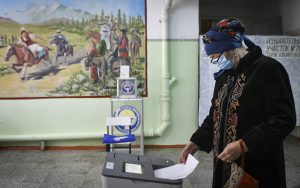On Monday, the day after Kyrgyzstan’s parliamentary election, there were familiar scenes in Bishkek: protests.
Per preliminary results, four of the 16 parties contesting the election cleared the necessary national threshold of 7 percent to secure seats: Birimdik (Unity) with 24.5 percent, Mekenim Kyrgyzstan (My Homeland is Kyrgyzstan) with 23.88 percent, the Kyrgyzstan Party with 8.76 percent, and Butun Kyrgyzstan (United Kyrgyzstan) with 7.13 percent.
Supporters of at least eight parties that did not secure seats in the next parliament took to the streets after the preliminary results showed a massive victory for two parties closely tied to the government.
Birimdik, founded this year, included President Sooronbay Jeenbekov’s brother in its party list and is heavily associated with the present government. Mekenim Kyrgyzstan, on the other hand, was founded after the 2015 parliamentary election and included in its party list Raimbek Matraimov’s brother. The Matraimovs have been at the center of several waves of corruption allegations, sparking protests last November.
Only one party that could be considered opposition — the nationalistic Butun Kyrgyzstan — cleared the threshold for seats, which runs counter to sentiment witnessed in the streets of Bishkek and in surveys of Kyrgyz citizens. In an International Republican Institute (IRI) poll conducted in August, 53 percent of respondents said Kyrgyzstan was headed in the wrong direction.
For a population dissatisfied with the country’s direction, the election results depict a contrary victory for the status quo.
As in the IRI poll, so too with the election: There is a regional divide. Eighty-eight percent of respondents to the IRI survey in the capital, Bishkek, said the country was headed in the wrong direction; in the city of Osh, however, 79 percent said the country was headed in the right direction.
As Eurasianet reported from the ground in Kara Kuldja, the Jeenbekovs’ hometown in Osh region, “Of the 16 parties on the ballot, only one had campaign posters, banners and billboards plastered across town: Birimdik.” According to Eurasianet, of the 1,487 ballots cast at one of the polling stations in the Kara Kuldja district, all but one were for Birimdik.
But still, across regions the two parties seemed to have strong showings. The protesters in Bishkek and some observers point to the use of so-called administrative resources and dirty tricks. “Administrative resources” is a post-Soviet space euphemism for candidates and parties using their official positions and connections for electoral benefit. This can include pressuring government employees to attend rallies and vote for certain parties, manipulating mass media, and more.
The preliminary findings of the OSCE’s election monitoring mission states that they “received numerous credible reports from interlocutors throughout the country about instances of vote buying and abuse of administrative resources.”
Lack of trust in the system, the report noted, left many to not even bother filing complaints.
The August IRI poll also asked what politicians people trusted. Here, too, the poll and the election results point in different directions. Omurbek Babanov toped the list of trusted politicians, with 16 percent, followed by Kamchyek Tashiev (12 percent), and Adakhan Madumarov (11 percent). But Babanov’s (former, technically) party Republika only captured 5.79 percent of the national vote. Tashiev’s Mekenchil (Patriotic) party, looks to have come agonizingly close to the threshold at 6.85 percent of the national vote. And Madumarov’s Butun Kyrgyzstan just squeaked by the threshold to secure likely seats in the parliament.
Given that, as the OSCE noted in its preliminary findings report, “Political parties are built around personalities, rather than around platforms,” it’s curious that the parties associated with the most-trusted politicians largely failed to find success in the election. President Jeenbekov, in the same survey question, was cited as a trusted politician by just 5 percent.
RFE/RL reported on several “irregularities” witnessed by its reporters during the election, including minibuses allegedly taking “the same groups of people to several polling stations to cast ballots” and attacks on opposition politicians and media.
Kyrgyzstan earned the name “island of democracy” on the back of its two revolutions in 2005 and 2010 and its political divergence from the one-man shows in neighboring states.

































